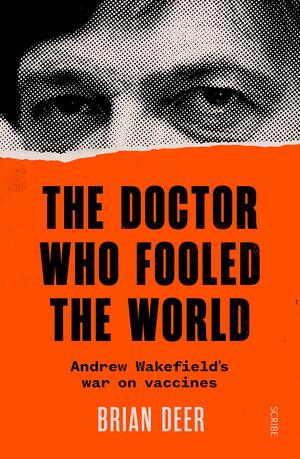
The Doctor Who Fooled the World: Andrew Wakefield's War on Vaccines
by Brian Deer
Genres: Non-fiction, SciencePages: 416
Rating:

Synopsis:From San Francisco to Shanghai, from Vancouver to Venice, controversy over vaccines is erupting around the globe. Fear is spreading. Banished diseases have returned. And a militant “anti-vax” movement has surfaced to campaign against immunization. But why?
In The Doctor Who Fooled the World, award-winning investigative reporter Brian Deer exposes the truth behind the crisis. With the page-turning tension of a detective story, he unmasks the players and unearths the facts. Where it began. Who was responsible. How they pulled it off. Who paid.
At the heart of this dark narrative is the rise of the so-called “father of the anti-vaccine movement”: a British-born doctor, Andrew Wakefield. Banned from medicine, thanks to Deer’s discoveries, he fled to the United States to pursue his ambitions, and now claims to be winning a “war.”
In an epic investigation, spread across fifteen years, Deer battles medical secrecy and insider cover-ups, smear campaigns and gagging lawsuits, to uncover rigged research and moneymaking schemes, the heartbreaking plight of families struggling with disability, and the scientific scandal of our time.
I’ve always felt that Andrew Wakefield was a murderer — growing up with my mother, who is a doctor, I’m not sure any other opinion was possible. As someone who’s now studying for a degree in infectious diseases, I feel it even more. So my comment on picking up Brian Deer’s account of Andrew Wakefield’s fraud, The Doctor Who Fooled the World, was that it was surely going to raise my blood pressure.
It did, of course. The very beginnings of Andrew Wakefield’s fraud could have been, possibly even were, an honest attempt to look into a hypothesis. But then money got involved, big money, and he saw his name writ in lights — and he wanted it so badly. He still wants it, and he’ll do anything for it: that is apparent in all his actions.
It doesn’t help that I don’t think (from Deer’s account anyway) that Wakefield really understood the science that he was having others do for him. He latched onto theories suggested for him by non-scientists, and tried to make them true by force of will, altering the evidence until it suited his purposes. It also likely wasn’t helped by other people around him, convinced by his charisma, trying to get him the results he wanted.
This is why we start out with a null hypothesis. We go in assuming that we’re wrong, and it requires clear evidence that meets criteria that suggest it didn’t happen by chance in order to change our minds. Even then, even when we’re got a likelihood of P = 0.05, that’s still a chance that we got this result by chance (to be accurate, P = 0.05 means that there’s a 5/100 = 1/20 chance that the observed result arose by pure chance). Deer doesn’t go into the depths of whether Wakefield had a null hypothesis, or what his P-values looked like, but the rest of his descriptions inspire no confidence, along with the fact that he refused to conduct a proper, blinded trial when it was offered to him on a silver platter.
If you’re a scientist, you don’t say no to the chance to run a fully funded study that will prove or disprove your theory — not unless you think there’s a significant chance you’re wrong, and you want to make money out of the ambiguity that you might just be right.
Deer discusses all kinds of ways in which Wakefield created and perpetuated his fraud, and also some of the human impact thereof. It’s a journalist’s point of view, so sometimes the scientific detail I crave isn’t there, but it’s explained well and clearly for a layperson. It’s difficult to say I enjoyed this, but it was valuable.
I don’t think it would convince anyone who isn’t already willing to be convinced, unfortunately, but if someone’s on the fence, it might help.
Rating: 4/5

Unfortunately the full scientific information would not convince the doubters because they would not understand it but I have seen most of it and it is a load of rubbish.